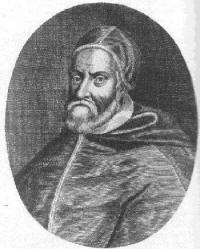 Urban
VII was the first of three popes whose combined reigns did not last a year and a
half.
Urban
VII was the first of three popes whose combined reigns did not last a year and a
half.
Giambattista Castagna was born in Rome on August 4,1521, of a noble family. He
studied at Perugia and Padua and finally took a doctorate in canon and civil law
at Bologna. He entered the service of his uncle, Cardinal Girolamo Verallo, and
started his diplomatic journeyings by going with him on a legation to France in
1551. In 1553 he was made archbishop of Rossano in the Kingdom of Naples. Though
he served his diocese for twenty years before resigning it in 1573, Castagna
made his chief reputation as a brilliant diplomat. Pius IV sent him into Spain
with Cardinal Buoncompagni in 1564 and then left him there as nuncio.
He got along well with the Spaniards, and it was during his nunciature that the
League, which resulted in the victory of Lepanto, was formed. Under Gregory XIII
Castagna served as nuncio in Venice and legate in Bologna. He represented
Gregory at the peace conference between the Spaniards and the Dutch held at
Cologne in 1579-1580. Gregory made him a cardinal in 1583, and only two years
later at the conclave held after Gregory's death, Castagna was considered a
likely candidate for the papacy. Sixtus V, like his predecessors, had a high
regard for Castagna and used him as legate in Bologna. Besides all these
diplomatic offices, Castagna had played a distinguished part in the last
sessions of the Council of Trent. After Sixtus died there was some civil
commotion, but the cardinals got matters under control, and the conclave went
smoothly enough. Contrary to what often happens, Castagna went into the conclave
the favorite and came out pope.
He was elected September 15, 1590, and took the name Urban VII. Urban showed his
kind and sympathetic nature at once. He promptly told the pastors of Rome to
draw up for him lists of their needy parishioners. He ordered the bakers to keep
the price of bread low and told them that he would make up any loss they might
thereby suffer--an early and very Christian example of price subsidy! Although
seventy when elected, Urban was quite vigorous, and it was hoped that this kind
and capable man would live to do much for the Church. But that terrible scourge
of old Rome, the malarial mosquito, struck the new Pope down. Within three days
of his election, Urban was shaking with fever. The people of Rome, frantic at
the thought of losing so good a shepherd, multiplied prayers as 30,000 men
marched in procession. The Jews, too, are said to have fasted and prayed for the
good Pope's recovery. But it was not to be. Urban had Mass celebrated every day
in his room and just as the Mass was ending on September 27, he died peacefully.
Charitable to the last, Urban left his private fortune to provide endowment for
poor girls.
Excerpted from "Popes
Through the Ages" by Joseph Brusher, S.J.

